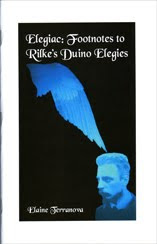__125__.jpg)
Inventing God
Robert Pringle
Pudding House Chapbook Series
ISBN 1-58998-657-1
$10.00
"A school of Protestant fish
boats down the Ulanga
aboard Tuesday evening Bible study
pouring gillfuls of Gordon's gin
on the rocks of free will…"
'Inventing God' poses "on a console TV, stares at the finishing touch."
Robert Pringle deconstructs his relationship with established religion;
looking for his own god, "God should have stayed, adjective and phrase."
The poems present all the 'things' god is not. I think the poems are protesting
but I'm not entirely convinced of what is being presented as protest, except the
poems do protest very well:
"A man and a woman
have knocked on the door.
Ten a.m., near freezing,
I hear the shifting
of leaflets and feet.
They knock again,
brood in close voices.
Wonder what they think
of my custom Harley
parked in the driveway.
I knock in return -
a chatter of teeth
and cross-purposes,
unwilling, it seems,
to trust their senses.
"We can lead the way
to His Heavenly Kingdom,"
quiet, a jangling of keys.
"I'm here to enjoy
His earthly Paradise,"
quiet, imagining that hot=
throated roar. "Are you
on the road to Armageddon?"
They could be easing
down the steps. "We know
the prophecy of Route 666!"
"I offer the joy of His
open road - hope the fuel,
charity a fair weather,
faith leaning into every turn."
Some of the poems read like a christian person on LSD
"Eagling from slits in spires, then race round
desks to shake His maiden-splitting penis,
flutter next the cloakroom coats as if
skirts in the face of Mrs. Spence
for all her harangues, hyperbole, finger-pointing…"
or:
"She LISTENS
to the test pattern
on a console TV, STARES
at the finishing touch to a delicate hand
of The Galapagos Madonna,
clay homologue
to Darwin-in-Drag effigy
hanging from a Dollar Mark Cross."
Pringle experiments with word play, uses language poetry and sometimes
the poems are metaphysical in their meaning, in presenting the truth as
omnipresent; the poet references ubiquitous themes, trying to corral
individual thought, reflections on society; (Donne?) or the modern poet lament
(Ferlinghetti?) All this is written with religion and social issues as subject matter
(mostly).
"…Late in the game…"
"We could be sucking in sulphur fumes
right now, straight from Satan's inflamed
nostrils…But, Revelations in extensor
" 'To him who conquers, I will grant…life
in paradise'." "We conquered! and every
particle of 'them' is now our cannibal bodies;…"
Where the poetry fails is in the conjunctions. There is a disconnect that
might leave the reader wondering what one phrase or line or verse has
to do with the other. Forget what I just wrote: I can't find a good
enough example from the poems to substantiate or to make a clear
connection:
"…Molten curse of earth
perpetual, black land sinking, senseless
with good and evil,…
Kind of the boatman guide,
nodding in place of my name."
The writing is powerful and I recommend supporting this fine small press,
'Pudding House,' by investing in this chapbook or any of their books.
'Inventing God' is a book that will call you back to read again and again.
Irene Koronas
Review:
Ibbetson Street Press
Poetry Editor:
Wilderness House Literary Review

__125__.jpg)


